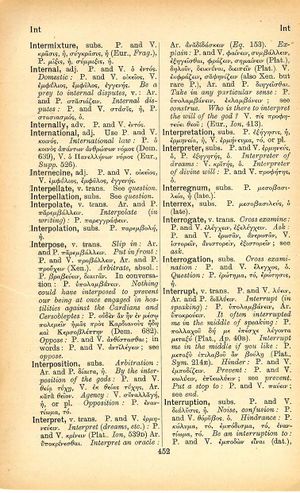interrex: Difference between revisions
Νέος πεφυκὼς πολλὰ χρηστὰ μάνθανε → Dum floret aetas, disce, quod scitum decet → In jungem Alter lerne viel, was brauchbar ist
(D_5) |
(Gf-D_5) |
||
| Line 1: | Line 1: | ||
{{Woodhouse1 | {{Woodhouse1 | ||
|Text=[[File:woodhouse_452.jpg|thumb|link= | |Text=[[File:woodhouse_452.jpg|thumb | ||
|link={{filepath:woodhouse_452.jpg}}]]'''subs.''' | |||
P. [[μεσοβασιλεύς]], ὁ (late). | P. [[μεσοβασιλεύς]], ὁ (late). | ||
}} | }} | ||
Revision as of 07:40, 14 August 2017
English > Greek (Woodhouse)
subs.
P. μεσοβασιλεύς, ὁ (late).
Latin > English (Lewis & Short)
inter-rex: rēgis, m.,
I one who held the regal office between the death of one king and the election of another; a regent, interrex, Liv. 1, 17; 1, 32.—
II During the times of the republic, one who held the supreme power from the death or absence of the chief magistrates till the election of new ones: L. Flaccus interrex legem de Sulla tulit, Cic. Agr. 3, 2, 5; id. Leg. 1, 15, 42; id. Dom. 14, 38: prodere, to nominate, appoint, id. Agr. 3, 2, 5: creare, Liv. 5, 31, 8: infestam patribus plebem interreges cum accepissent, id. 7, 21.
Latin > French (Gaffiot 2016)
interrēx,¹¹ ēgis, m., interroi : a) magistrat qui gouvernait jusqu’à la nomination d’un roi : Liv. 1, 17, 10 ; 1, 32, 1 ; b) sous la républ., jusqu’à l’élection des consuls nouveaux : Cic. Agr. 3, 5 ; Leg. 1, 42.

